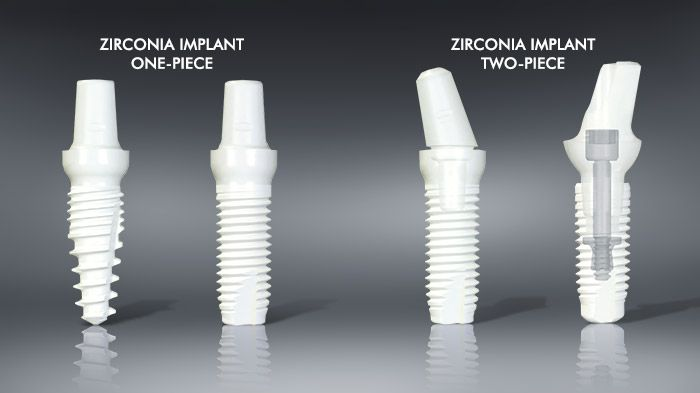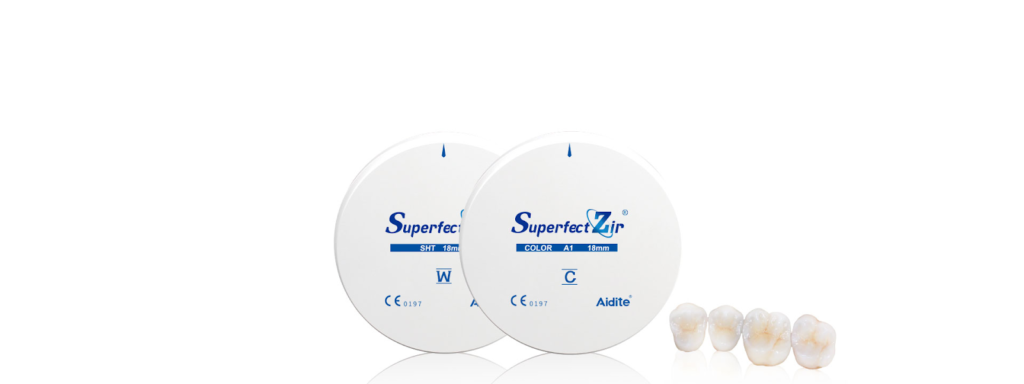Dental implants are a surgical method of replacing missing teeth. They are placed into the jawbone, where they serve as artificial roots. Traditionally titanium is used for dental implants because of its strength and ability to integrate with bone. However, zirconia dental implants have emerged as an innovative alternative. These implants are made of zirconium dioxide which is a ceramic material. It has several advantages like biocompatibility, unmatched strength, and aesthetics due to which it is gaining popularity.
This article discusses cubic zirconia dental implants and their advantages and disadvantages. We’ll also examine how it compares to other materials such as titanium.

What are Zirconia Dental Implants?
Zirconia dental implants are a type of implant made from zirconium dioxide which is a high-strength ceramic material. They offer a metal-free option for replacing missing teeth. By choosing zirconia you do not need to compromise on aesthetics. Zirconia implants are white, so they look more natural and blend well with the gums.
The key components of a zirconia implant include the implant body, which is surgically placed in the jawbone. The other one is the abutment, which connects the implant to the replacement tooth.
Based on the number of pieces, the following are two types of zirconia dental implants:

One Piece Zirconia Implants (Monolithic)
One Piece zirconia implants are made from monolithic zirconia which refers to a single solid piece of zirconia. In this type of implant, the body and abutment are fused together. This eliminates micro-gaps between parts. With no gaps, there’s less risk of bacteria buildup and infection.
Two Piece Zirconia Implants
There are certain situations where one-piece implants cannot be used. In these situations, two piece zirconia implants are used. This design consists of two separate components. The implant body is surgically placed into the jawbone, where it integrates with the bone over time. After this integration, the abutment is attached to the implant body. This design allows for more customizability.
Benefits of Zirconia Dental Implants
The following are the benefits of zirconia dental implants:
Biocompatibility
Some people are allergic to metals for them titanium can cause itchiness and inflammation. Zirconia dental implants are metal-free. Zirconia does not cause any adverse reaction in the body. It’s gentle on the body and less likely to cause any unwanted reactions.
Aesthetic Appeal
While getting implants a lot of people opt for natural-looking material. Cubic zirconia dental implants are white and have high translucency. Getting zirconia dental implants avoids the risk of dark lines along the gum line.
Low Plaque Affinity
Zirconia has a very smooth surface. It is difficult for bacteria to stick to it due to its surface. So, your gums stay healthy and your oral health improves.
Corrosion Resistance
Zirconia is bioinert and doesn’t corrode. It also stays in place and doesn’t migrate to other parts of the body. Titanium, on the other hand, can corrode in moist conditions. Some toothpastes can even speed up titanium corrosion.
Strength and Durability
Chewing exerts a lot of force on teeth which is why the material used matters so much. It needs to be tough, reliable, and built to last. That’s where Aidite Zirconia comes in. Aidite dental zirconia has an unmatched strength of 1300MPa without compromising on looks. With our advanced zirconia, you can trust that your dental implants will stand the test of time.

Better Osseointegration
Osseointegration is the process where an implant fuses with the jawbone, creating a stable and secure foundation. Zirconia dental implants are known for their excellent osseointegration, promoting strong bone bonding and long-term stability.
Limitations of Zirconia Dental Implants
Here are some of zirconia dental implants problems:
- As compared to titanium zirconia is a newer material. So there is not enough data available to support the long-term success of zirconia dental implants.
- Despite their strength, zirconia implants can be more brittle than titanium. They are prone to fractures under high stress.
- Zirconia dental implants are not as commonly available as titanium ones. For some patients, access to them may be limited.
Zirconia Dental Implants Cost
The cost of zirconia dental implants can vary depending on different factors such as location, the complexity of the procedure, and the specific dental clinic. On average, the price for a single zirconia implant typically ranges from $1,500 to $7,000. But remember this price can be different from the price in your local place.
Zirconia implants can be more expensive than titanium implants. While titanium implants are well-established still some people prefer zirconia due to its benefits.
Zirconia dental implants can cost more upfront but their advantages justify the investment.
Zirconia vs. Titanium Implants
Although both zirconia and titanium have high strength and durability they differ in some properties. Titanium has been used as a dental material for a long time. Zirconia on the other hand is comparatively a new material.

Let’s look at some key differences between titanium and zirconia dental implants.
Material Properties
Titanium implants are metal while zirconia dental implants are ceramic. Being a metal, titanium is highly resistant to corrosion and stays stable over time. One thing about titanium is that it can release some ions in the body but it is very rare. On the other hand, zirconia is also very resistant to corrosion and it is biocompatible. Zirconia does not release any ions in the hand which makes it even safer than titanium. Zirconia is an attractive option for those who prefer metal-free solutions.
Aesthetic Differences
The major difference between zirconia and titanium is their aesthetic appeal. Aesthetics are of great importance when considering different factors of dental materials. Even though titanium is strong and reliable it can cause a visible dark edge at the gum line as the gums recede over time.
One of the biggest advantages of zirconia is its natural appeal. Zirconia dental implants are white and blend with other teeth very smoothly.
FAQs about Zirconia Dental Implants
How much do zirconia dental implants cost?
The price of zirconia implants depends on different factors including location and case requirements. On average a single zirconia dental implant costs $1000 to $7000.
How much do zirconia dental implants last?
Zirconia is a very durable material. It lasts up to 20 years. If you follow a proper oral care routine it can last you for a lifetime.
Are zirconia dental implants safe?
Yes, the biocompatibility of zirconia makes it safe to use in the human body. It does not trigger an immune response in the body.
How do you clean zirconia dental implants?
The cleaning routine for zirconia dental implants is the same as for natural teeth. Brush regularly with a non-abrasive toothpaste and floss regularly.
Conclusion
Zirconia dental implants are gaining a lot of popularity because of their unique set of advantages. As compared to titanium zirconia provides metal-free dental implants. They stand out for their biocompatibility, natural aesthetics, and corrosion resistance. While their initial cost is higher their benefits outweigh the drawbacks. The ability of zirconia to integrate effectively with the jawbone ensures stability and durability. Aidite’s advanced zirconia takes these advantages a step further, delivering unmatched strength and performance without compromising on aesthetics.



